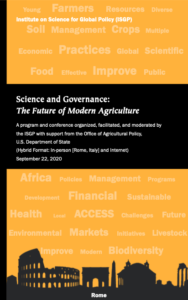Future of Modern Agriculture (FMA), September 22, 2020
Presenters: Dr. Pedro Rocha, Inter-American Institute for Cooperation on Agriculture; Dr. Jeremy Brice, The London School of Economics and Political Science; Mr. Mandla Nkomo, Solidaridad Network - South Africa Regional Expertise Centre; Dr. Thouraya Triki, International Fund for Agricultural Development
Hosts: Office of Agriculture Policy, U.S. Department of State
While the world’s food and agricultural systems have benefited from vast scientific and technological progress in the past decades, the current global food system continues to face critical challenges in achieving food security in many regions of the world. Existing disparities risk being exacerbated in the coming decades of population growth and environmental stressors. This is exemplified by the current threats posed to food security by COVID-19. Both scientific and technological innovations, as well as traditional approaches (often rooted in cultural knowledge and agro-ecological methods), provide promise for alleviating growing pressure on agricultural systems worldwide. Realizing these opportunities is key to addressing the challenge of achieving global food security while simultaneously improving environmental resilience.
The content of this book was taken from material presented at a conference on the Future of Modern Agriculture (FMA) organized, facilitated, and moderated by the Institute on Science for Global Policy (ISGP) with support from the U.S. Department of State in coordination with its U.S. Mission to the United Nations Agencies in Rome, Italy. Due to health and travel concerns related to the COVID-19 pandemic, the FMA program was held in a hybrid in-person (Rome, Italy)/internet format to optimize global participation on September 22, 2020. The conference engaged major public, private, and third sector communities involved in global food and agricultural systems to evaluate the roles of modern agricultural technologies and agroecology in meeting the 2030 Sustainable Development Goals.
The critical debate and extended caucus format pioneered by the ISGP has been used for over a decade to promote the candid exchange of ideas and clarity of priorities required for real-world decisions on a wide range of topics. The hybrid format of the FMA conference was adapted to maintain this robust and effective discussion model. As a not-for-profit, 501(c)(3), nonpartisan organization, the ISGP does not itself independently express opinions nor lobby on any issue. The invitation-only FMA conference, facilitated and moderated in a not-for-attribution environment defined by the Chatham House Rule, seeks to address the diverse views held by stakeholders and subject-matter experts engaged throughout global food/agricultural systems.
Please contact NiCole Bice at nbice@scienceforglobalpolicy.org for a hard copy of the FMA book.

